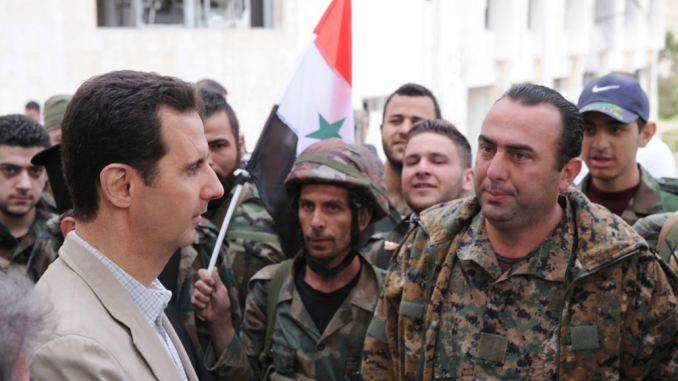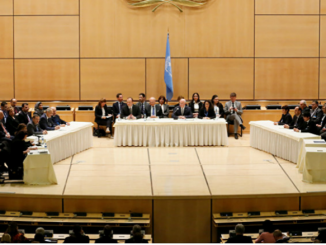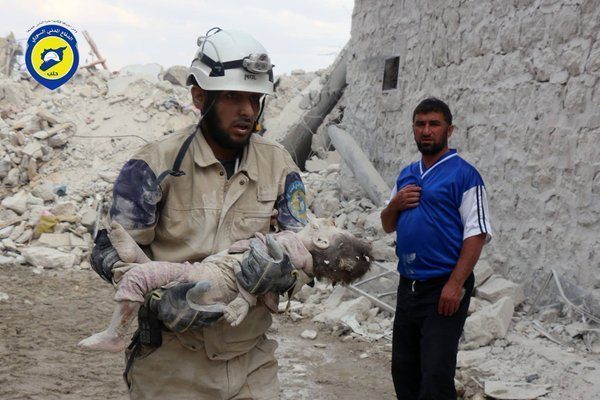
In his last interview, Bashar al-Assad said that the last round of Syria peace talks in Geneva were fruitless, calling the opposition delegation “terrorists” and saying that Local “reconciliation” agreements are the real political solutions.
The new round of Syria peace talks has started in Geneva on February 23. after it was previously planned to be on February 8. but delayed in order to take advantage of the results of Astana settlement about the ceasefire in Syria, which was planned by Russia, Turkey, and Iran.
The UN special envoy for Syria, Staffan de Mistura, addressed the both delegations asking them to work together to help in ending the crisis in the country.
De Mistura told the representatives of both delegations that they had a joint responsibility to end a conflict that had killed hundreds of thousands and displaced millions.
The discussions were almost stalled as both parts insisted on their own goals before the talks and accused each other of trying to hinder talks.
The opposition’s delegation accused the regime delegation of seeking to hinder the peace talks as its head said the main goal of the talks should be combating terrorism without mentioning the political process, while regime forces in Syria kept breaching the ongoing shaky truce and killed dozens of civilians since the talks started.
However, both sides could point to small victories. The opposition said that the question of political transition was seriously addressed for the first time, while U.N. envoy Staffan de Mistura said counter-terrorism – an issue pushed by Assad regime’s delegation – had been added to the agenda.
Read more: Has Geneva talks ended with clear agenda as de Mistura said?
Fruitless talks, no unified opposition
Assad, in an interview with Chinese TV station Phoenix that was published by Syria’s state television SANA on Saturday, was asked about the Geneva talks and said that those talks were fruitless and he wasn’t satisfied with them or the agenda that was reached in the end.
“We didn’t forge this mechanism; it was forged by de Mistura and the UN with the influence of the countries that wanted to use those negotiations in order to make pressure on Syria, not to reach any resolution. As you just said, each one represents a different agenda, even the opposition delegations, it wasn’t one delegation; different delegations of the opposition,” Assad said.
Assad said further that the real problem in the talks was no unified opposition delegation.
“You have different groups, you have people who are, let’s say, patriotic, but they don’t represent anyone, they represent themselves.”
“You have others who represent the terrorists, and you have terrorists on the table, and you have others who represent the agenda of foreign countries like Saudi Arabia, like Turkey, like France, UK and maybe the United States. So, it’s not a homogeneous meeting. If you want it to be fruitful, going back to the first point that I mentioned, it should be real Syrian-Syrian negotiations.”
“We didn’t expect Geneva to produce anything, but it’s a step and it’s going to be a long way,” Assad said.
The idea of non-unified opposition delegation was used by Russia to foil the peace talks, according to the opposition delegation.
Other than the High Negotiations Committee (HNC), there are many other groups that are considered by the UN to be among the opposition including the Kurdish political wing of the YPG forces, the Cairo platform, and the Damascus platform which is backed by Russia.
These groups have doesn’t share the HNC’s view of Syria’s future and have been accused of hindering the political process. Damascus group, for example, is said to unify the opposition figures inside the country. Most of them refused the revolution when it started and formed their delegation after the UN started its political efforts to end the war. The group is supported by Russia, accepts the idea of Assad being in power and back the Russian air campaign against Syrian civilian saying its aim is fighting terrorists.
Local “reconciliation” agreements, fighting terrorism
When asked about the solution he imagines, Assad said that it involves fighting who he called as terrorists, while seeking dialogue through “reconciliation agreements” with those who decide to return to the “government’s amnesty.”
“You need to have two parallel ways: the first one is to fight the terrorists, and this is our duty as government, to defend the Syrians and use any means in order to destroy the terrorists who’ve been killing and destroying in Syria. The second one is to make a dialogue. This dialogue has many different aspects” Assad said.
“You have the political part, which is related to the future of Syria; what political system do you need, what kind? It doesn’t matter which one, it depends on the Syrians, and they’re going to have referendum about what they want. The second part is to try to bring many of those people who were affiliated to the terrorists or who committed any terrorist acts to go back to their normality and lay down their armaments and to live normal life in return for amnesty that has been offered by the government, and we’ve been going in that direction for three years, and it worked very well,” Assad added.
“So, actually, if you want to talk about the real political solution since the beginning of the crisis, of the war on Syria, till this moment, the only solution was those reconciliations between the government and the different militants in Syria, many of them joined the government now, and they are fighting with the government. Some of them laid down their.”
Assad regime forces, helped by Russian air power and Iran-backed Shiite militias, has steadily ended armed opposition influence in the remaining pockets of resistance around the capital, in addition to many areas in Syria, using a series of army offensives and evacuation agreements, after years of siege, starvation, and daily bombing.
Assad regime describes the evacuation deals as “reconciliation” or “settlement agreements”, but rebels say they involve the forcible displacement of whole communities from opposition areas after years of siege and bombardment.
The Syrian crisis began as a peaceful demonstration against the injustice in Syria. Assad regime used to fire power and violence against the civilians and led to armed resistance. 450.000 Syrians lost their lives in the past five years according to UN estimates, and more than 12 million have lost their homes.



